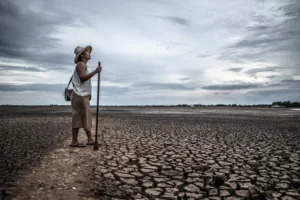Have you ever stopped to consider the environmental impact of the food you eat? The choices we make about our diet can have a significant effect on the health of our planet. From the production and transportation of food to the waste it generates, every step of the food chain has an impact on the environment. In this blog post, we will explore the ways in which our diet can contribute to climate change and environmental degradation, and how we can make more sustainable choices.
Diet and Climate Change

One of the biggest contributors to climate change is the production of greenhouse gases, such as carbon dioxide and methane. Surprisingly, the food we eat is responsible for a significant portion of these emissions. The production of meat, especially beef and lamb, is particularly resource-intensive and generates high levels of greenhouse gas emissions. Livestock farming requires vast amounts of land, water, and feed, and produces methane, a potent greenhouse gas. By reducing our meat consumption and opting for plant-based alternatives, we can significantly reduce our carbon footprint.
Learn More About The Psychology of Dieting and Food Choices
Food Waste and the Environment

Another major environmental issue related to our diet is food waste. It is estimated that about one-third of all food produced globally goes to waste. When food is wasted, all the resources used in its production, such as water, energy, and land, are also wasted. Furthermore, food waste that ends up in landfills produces methane as it decomposes, contributing to climate change. By being mindful of our food consumption and finding ways to reduce waste, we can make a positive impact on the environment.
Organic Farming and Biodiversity

Choosing organic food can also have a positive impact on the environment. Organic farming practices prioritize soil health, biodiversity, and the reduction of synthetic inputs such as pesticides and fertilizers. By supporting organic farming, we are encouraging a more sustainable and ecologically friendly approach to food production. Organic farms provide habitats for a wide range of wildlife and promote biodiversity, which is essential for a healthy and resilient ecosystem.
Learn More About The Vegan Diet: A Plant-Based Lifestyle
Seafood and Ocean Health

When it comes to seafood, our choices can have a direct impact on the health of our oceans. Overfishing and destructive fishing practices can deplete fish populations and damage marine ecosystems. By choosing sustainably sourced seafood and supporting responsible fishing practices, we can help protect our oceans and ensure the long-term viability of fish stocks. Look for certifications such as the Marine Stewardship Council (MSC) or the Aquaculture Stewardship Council (ASC) when purchasing seafood.
Local vs. Imported Foods

The distance that food travels from farm to plate also has an impact on the environment. Transporting food over long distances requires large amounts of fuel, contributing to greenhouse gas emissions. Choosing locally sourced foods reduces the carbon footprint associated with transportation. Additionally, buying local supports local farmers and the local economy. Consider visiting farmers’ markets or joining a community-supported agriculture (CSA) program to access fresh, locally grown produce.
Learn More About Travel and Dieting: Tips for Staying Healthy on the Go
Conclusion
The environmental impact of our diet is significant, but we have the power to make a difference. By making sustainable choices such as reducing meat consumption, minimizing food waste, supporting organic farming, choosing sustainably sourced seafood, and opting for local foods, we can help protect the planet for future generations. Every small change in our diet can have a positive impact on the environment, so let’s make conscious choices and eat in a way that nourishes both ourselves and the planet.









Leave a Reply